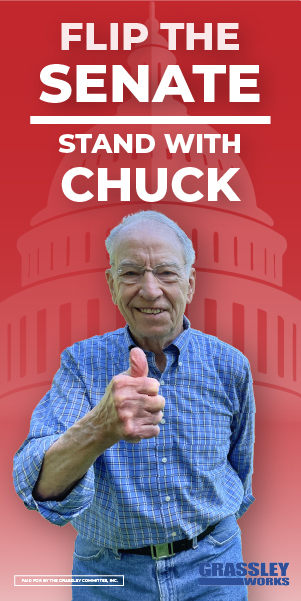Yesterday, I spent an hour sitting across from fellow political consultant and my Iowa campaign combatant Jeff Link (@linkiowa) on a panel at the legislative conference of the Iowa Credit Union League. It was moderated by legendary Iowa media figure Dean Borg who hosted Iowa Press for decades.
Over the years, Jeff and I have sparred on campaigns, political talk shows, talk radio, podcasts, and on Twitter. And while I like Jeff, and have even worked with him on a few public policy issues on which we agree, I’m starting to feel a little sorry for him on a campaign he leads and has put a lot of time into, called Focus on Rural America (https://www.focusonruralamerica.com). Here is their missions statement:
OUR MISSION
Focus on Rural America will identify the causes of the recent massive shifts in rural behavior by listening and engaging with working class voters in rural communities. After identifying the causes of the growing divide between rural and urban Americans and the issues that motivate them, FORA will develop messages that resonate in rural America and build support for a progressive economic agenda.
It’s a noble goal. But it won’t work.
I’ve worked in Republican politics in Iowa for over 35 years. I’ve worked winning campaigns like Governor Terry Branstad’s races, and losing ones like Mitt Romney’s general election campaign in 2012 (that one still hurts). Over the years, I’ve seen it all. But I’ve never seen such a dramatic shift in voter behavior as the one happening in rural Iowa and rural America. The bottom has dropped out for Democrats, and the evidence is overwhelming.
Take Howard County in northeast Iowa. It’s become famous for national political analysts and demographers because, out of 3,007 counties in America, it had the SINGLE LARGEST swing from Obama to Trump in the four short years between 2012 to 2016.
Barack Obama won the county in 2012 by almost 500 votes or about 16%. In 2014, a great Republican year, Joni Ernst won Howard County by about 250 votes. In a terrible Republican year in 2018, Kim Reynolds beat Fred Hubbell by about 650 votes. And in 2016, Donald Trump beat Hillary Clinton by over 700 votes.
The margins won by Republicans in rural Iowa outweighed big losses in urban counties like Polk and Linn in 2018, carrying Kim Reynolds to victory over Fred Hubbell.
What happened? Did voters in small towns and rural precincts wake up one day and decide to abandon the Democrats? Did their values change? Or did the Democratic candidates change?
It’s really two things: issues and culture.
On the issues, Democrats have drifted increasingly leftward. The days of the pro-life Democrats are over, with most leading Democrats unable to identify a single restriction they would place on abortion. When Democrats hold the White House, the EPA becomes the enemy of the American farmer, attempting to regulate everything from dust to ditchwater.
They lecture farmers about land management, animal rights, weed control, and tilling practices. Farmers, the original conservationists whose livelihood depends on the health and well-being of their land, don’t need to be told to take care of their greatest resource by urban progressives whose only exposure to farming is an urban rooftop heirloom tomato cooperative.
Now to the culture. In 2014, Bruce Braley’s campaign effectively ended when a video surfaced of the Congressman insulting Chuck Grassley, calling him “a farmer from Iowa who never went to law school” and therefore unsuitable to lead the Senate Judiciary Committee. SPOILER ALERT: Chuck Grassley became chair of the Judiciary Committee when Joni Ernst became the 51st Republican elected to the US Senate. Sorry, Bruce.
Earlier this week, a video surfaced of multi-billionaire Mike Bloomberg echoing the Braley disdain for farmers. Bloomberg said “I could teach anybody, even people in this room, no offense intended, to be a farmer. You dig a hole, you put a seed in, you put dirt on top, add water, and up comes the corn.”
Bloomberg on why farmers can’t work in information technology
MB: “I can teach anyone how to be a farmer 1 dig a hole 2 put a seed in 3 put dirt on top 4 add water 5 up comes the corn”
The skill 4information technology is completely different you need more grey matter#farmers pic.twitter.com/HM13tA6goz
— Pete (@NYBackpacker) February 15, 2020
Wow, Mr. Mayor, sounds easy! Let’s all become farmers! It’s not like you have to be a skilled mechanic to keep a $250,000 combine running in all kinds of weather conditions. Or understand large-scale tiling to manage moisture. Or learn the proper protein inputs to maximize livestock production. Or understand commodities market fluctuations, or financing land and equipment purchases, or crop rotations designed to maintain the optimal soil nutrients over decades of growing seasons.
In fact, modern agriculture is one of the most complicated, technical, and challenging fields I can think of. It’s impacted by everything from weather, to environmental regulation, trade policy, interest rates, labor markets, and transportation logistics. And no, Mr. Bloomberg, you CAN’T teach just anyone to be a farmer. Not in this century or any other. It takes a combination of knowledge, commitment, risk assumption, and work ethic that would shock the average urban progressive.
These are just two examples of the lack of appreciation for the lifestyle and culture represented in rural America. There are so many more. Most importantly, they are highlights of a growing distance between the life experience and priorities of voters in cities and voters in small communities and rural precincts.
Rural voters don’t need to get “woke,” they’re already awake to the disconnect between their priorities and those of the Democrats. Focus groups and marketing language aren’t going to change that.
David Kochel is a Republican political consultant who has worked Iowa and national campaigns for 36 years. He is a former Executive Director of the Iowa and Michigan Republican Parties, and has worked on six presidential campaigns, most recently serving as the senior strategist to former Governor Jeb Bush. Past and current clients include Sen. Joni Ernst and Gov. Kim Reynolds. He runs Redwave Communications, a public affairs marketing firm specializing in political and public policy direct mail and messaging.



